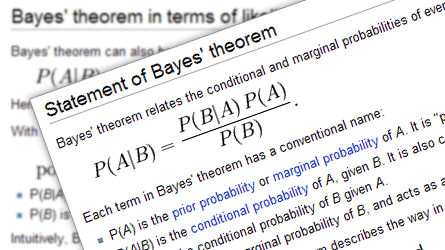Bayes Theorem Proves Jesus Existed (And That He Didn’t)
by Dr. William M. Briggs
Filed under Historicity

In his shockingly neglected Treatise on Probability, John Maynard Keynes put his finger on the difficulty people have with probability, particularly Bayes’s Theorem:
"No other formula in the alchemy of logic has exerted more astonishing powers. For it has established the existence of God from the premiss of total ignorance; and it has measured with numerical precision the probability the sun will rise tomorrow."
Probability carries with it “a smack of astrology, of alchemy.” Comte, Keynes reminds us, regarded the application of the mathematical calculus of probability as “purement chimérique et, par conséquent, tout à fait vicieuse" ("purely chimerical, and therefore, quite vicious".)
Note the last word, vicious, a word which was laughed off in the mad rush towards the utopia of Quantification an era which Comte, incidentally, and despite his intentions, helped usher in. We are very close to the moment when a number must by law be attached to every judgment of uncertainty.
Therefore, you may not be surprised to learn there is not one, but two books which argue that a fixed, firm number may be put on the proposition, "God exists." The first, by Stephen Unwin, is called The Probability of God: A Simple Calculation That Proves the Ultimate Truth, in which he uses Bayes’s theorem to demonstrate, with probability one minus epsilon, that the Christian God exists.
This is countered by Proving History: Bayes’s Theorem and the Quest for the Historical Jesus by Richard Carrier, who uses Bayes’s theorem to prove, with probability one minus epsilon, that the Christian God does not exist because Jesus himself never did.
So here we have probability proving two diametrically opposite conclusions. Comte was right: Alchemy, indeed.
Carrier of course has the harder task, and he attacks it with great gusto. He identifies as a mythicist, which he defines as someone who believes the historical Jesus was a myth. Carrier doesn’t just deny the divine Jesus, but asserts that the man called Jesus never existed.
He's convinced Jesus was a first-century creation, invented whole cloth, likely born of a conspiracy to create a new religion. I won’t dig into the details of Carrier’s points—I believe other contributors will be doing that at Strange Notions in the near future. But if you are interested, here is a link to a several-thousand-word essay in which Carrier “takes apart” a minor blog post written by a historian who claims Jesus lived.
On the other hand, an early review of Unwin’s work, which I have read and which is mercifully brief (and in large font with small pages), asks just the right question: “Can you imagine anyone arguing that the existence of evil in the world, given that God exists, is 23% as opposed to 24%, for instance?” Indeed. Too bad this kind of question is not asked in science.
The reviewer also recognized that probability questions have an order. That is, the probability that evil exists given God does is different from the probability that God exists given evil does. This crucial distinction Unwin minds attentively.
The real question is this: how can probability prove a thing and its opposite simultaneously? The answer is simple: the same way logic can prove a thing and its opposite. This does not prove that logic should be lumped with pseudoscience, however. You can’t blame the tool for its misuse.
All arguments of certainty and uncertainty are conditional. For example, is the proposition “Jesus was divine” true? Well, that depends on the evidence. If you say, “Given Jesus lived, died, and was resurrected as related in the Gospels” then the proposition has probability one (i.e., it is true.) But if you say, “Given Jesus was a myth, created as a conspiracy to flummox the Romans and garner tithes” then the proposition has probability zero (i.e., it is false.)
Given still other evidence, the probability the proposition is true may lie between these two extremes. In no case, however, is probability or logic broken. It does explain why focusing on probability is wrong, though.
These authors would help themselves better, and contribute to a more fruitful discussion about Jesus, by explicating the evidence and eschewing unnecessary quantification.
Related Posts
Note: Our goal is to cultivate serious and respectful dialogue. While it's OK to disagree—even encouraged!—any snarky, offensive, or off-topic comments will be deleted. Before commenting please read the Commenting Rules and Tips. If you're having trouble commenting, read the Commenting Instructions.












